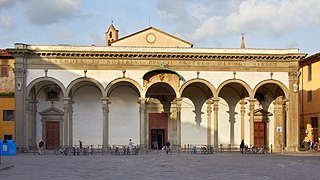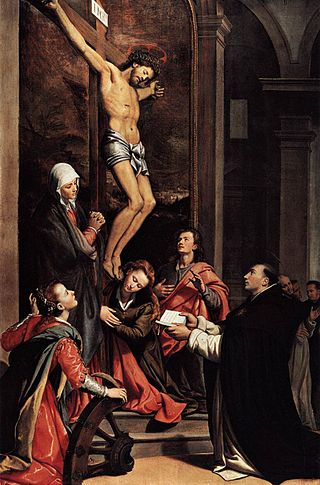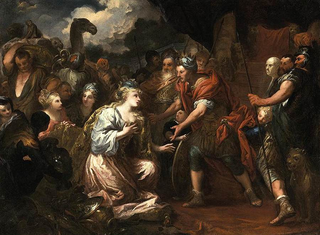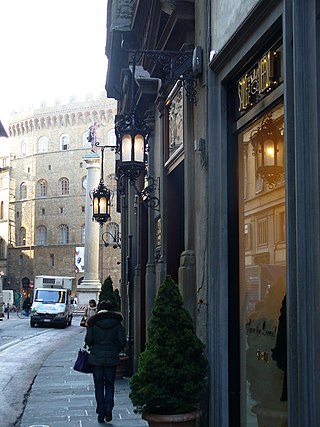
The Basilica della Santissima Annunziata is a Renaissance-style, Catholic minor basilica in Florence, region of Tuscany, Italy. This is considered the mother church of the Servite Order. It is located at the northeastern side of the Piazza Santissima Annunziata near the city center.

Santi di Tito was one of the most influential and leading Italian painters of the proto-Baroque style – what is sometimes referred to as "Counter-Maniera" or Counter-Mannerism.

Campitelli is the 10th rione of Rome, Italy, identified by the initials R. X, and is located in the Municipio I.

Campo Marzio is the 4th rione of Rome, Italy, identified by the initials R. IV. It belongs to the Municipio I and covers a smaller section of the area of the ancient Campus Martius. The logo of this rione is a silver crescent on a blue background.

There are more than 930 churches in Rome, which makes it the city with the largest number of churches in the world. Almost all of these are Catholic.

The Archdiocese of Bologna is a Latin Church ecclesiastical territory or archdiocese of the Catholic Church in Northern Italy. The cathedra is in the cathedral church of San Pietro, Bologna. The current archbishop is Cardinal Matteo Zuppi, who was installed in 2015.

Castelnuovo Berardenga is a comune (municipality) in the province of Siena in the Italian region Tuscany, located about 50 kilometres (31 mi) southeast of Florence and about 14 kilometres (9 mi) east of Siena. Since 1932 it has been included in the Chianti wine-production area.

Pietro Dandini was an Italian painter of the Baroque period, active mainly in Florence.

Charitable institutions attached to churches in Rome were founded right through the medieval period and included hospitals, hostels, and others providing assistance to pilgrims to Rome from a certain "nation", which thus became these nations' national churches in Rome. These institutions were generally organized as confraternities and funded through charity and legacies from rich benefactors belonging to that "nation". Often, they were also connected to national scholæ, where the clergymen of that nation were trained. The churches and their riches were a sign of the importance of their nation and of the prelates that supported them. Up to 1870 and Italian unification, these national churches also included churches of the Italian states.

Via de' Tornabuoni, or Via Tornabuoni, is a street at the center of Florence, Italy, that goes from Antinori square to Ponte Santa Trinita, across Santa Trinita square, distinguished by the presence of fashion boutiques.

The Pucci family has been a prominent noble family in Florence over the course of many centuries. A recent notable member of this family was Emilio Pucci, an Italian fashion designer who founded a clothing company after World War II.

Michelangelo Naccherino was an Italian sculptor and architect, active mainly in the Kingdom of Naples, Italy.

Sebastiano Folli (1568–1621) was an Italian painter of the late Renaissance period. He was a scholar of Alessandro Casolano, and a native of Siena. He distinguished himself by several frescoes in the churches at Siena, particularly the cupola of Santa Marta, and some subjects from the Life of St. Sebastian, in the church of that saint, painted in competition with Rutilio Manetti, to whose pictures they are in no way inferior. He visited Rome, and was employed in some considerable works for the Cardinal de' Medici, afterwards Leo XI. He died in 1621.

Palermo, main city of Sicily, has a big heritage of churches which ranges from the Arab-Norman-Byzantine style to the Gothic and the Baroque styles. In particular, the list includes the most important churches of the historic centre divided by the four areas of Kalsa, Albergaria, Seralcadi and Loggia.

The Cappella di San Luca, also called dei Pittori is a chapel found in the cloisters of the convent of Santissima Annunziata in Florence, Italy. It was built to serve as the burial chapel for members of the Accademia delle Arti del Disegno, and was donated by the Servites to the Academy in a document from 1565. It contains a collection of terracota statues from a number of prominent Florentine Mannerist sculptors.















